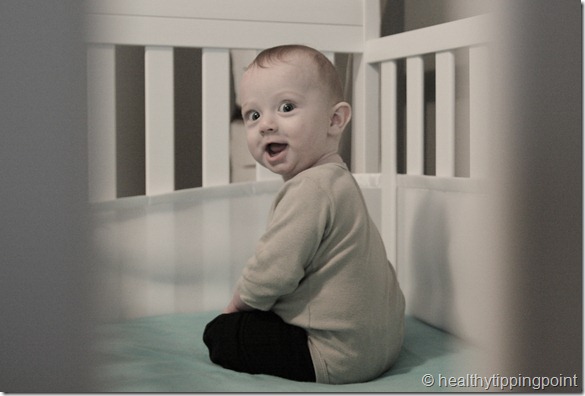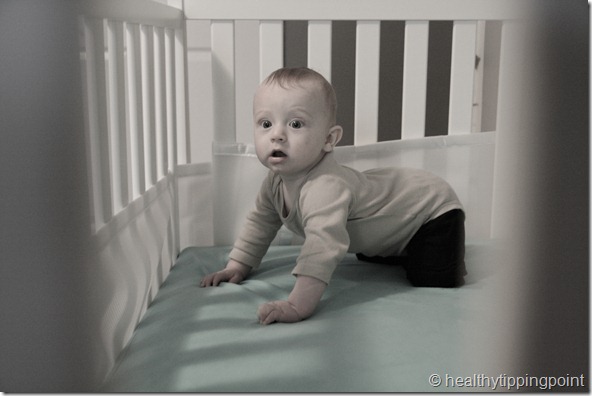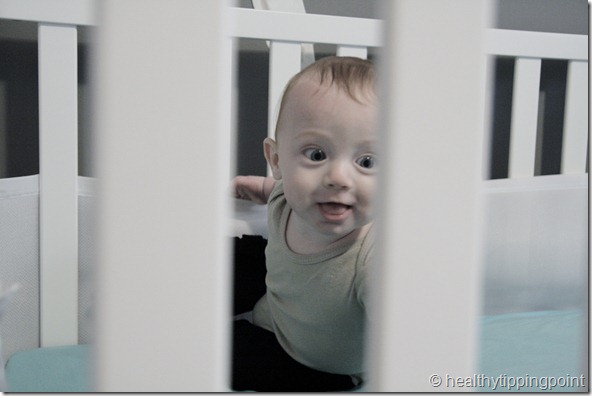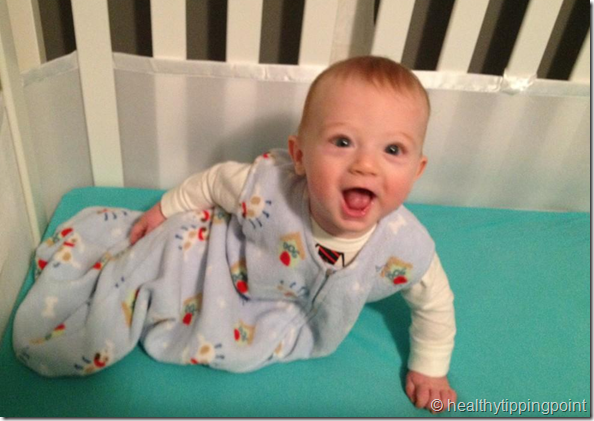I’m pretty sure blogging about baby sleep is akin to discussing politics or religion, but I’ll give it a shot.
I assume sleep-deprived parents will be blearily reading this post, so here’s a short summary of what we did:
-
Waited until he was old enough to begin training per our pediatrician’s recommendation (he nap-trained around 4.5 months and night-trained around 5.25 months)
-
Focused on teaching Henry to be capable of soothing himself back to sleep without the aid of a parent or a prop (like a bottle)
-
Stopped nursing him to sleep
-
Started off by following a strict nap schedule and getting naps under control
-
Allowed him to protest cry
-
Responded to protest crying at regular intervals (five or ten minutes) in accordance with severity of crying. Did not respond to light protest fussing more than once (at the ten minute mark).
-
End result? After six nights of sleep training, he slept from 8:30 PM to 7:00 AM with no crying. OH YEAH!
Before I had my baby, I knew that sleep with a newborn would be rough – everyone talks about it, right? But really, I had no idea how rough it could be (and I know that Henry wasn’t that bad). Before training, we were often up four, five, six times a night. Every night. It was so, so horrible and draining after a few months.
Based on my drug-free birth and other ‘crunchy’ leanings (um, I did eat my placenta), I think lots of readers expected me to practice more Attachment Parenting principles. AP is generally against protest crying sleep training, instead promoting bed-sharing or co-sleeping, responding immediately to a baby’s wakeups, and frequent nighttime nursing. While the AP view is popular, I am not a AP parent, and it is certainly not the only way to handle a baby’s sleep. Others believe that you should just let the child naturally figure sleep out and not try to train at all. But I always knew that I would do some sort of sleep training with Henry. Beyond the early months, I had zero desire to bed- or room-share, and trust me – Henry was not figuring it out on his own anytime soon. I really don’t think there is one way to help your baby’s sleep, and I don’t think there’s anything wrong with AP principles or other techniques… I just believe our sleep training plan was the best for Henry and the adults in the house.
Also, it’s really, really important to discuss your plan (whatever it is) with your baby’s doctor. I’m not a doctor; I’m just a mom… and a first-time mom to boot. I’ve heard everything from, “You can sleep train at 3 months†to “Wait to sleep train until they can crawl†to “A baby can’t go overnight without food until he’s a year old†to “A baby can sleep through the night at 4 months.†Again, so much of when a baby can or cannot sleep through the night or go longer without eating is so dependent on the child. There is definitely NO one-size-fits-all approach to baby sleep.
That being said – here’s what we did and what finally worked for us:
-
Research, Research, Research: I read many sleep booking (Healthy Sleep Habits, Happy Child, The Baby Whisperer, On Becoming Baby Wise (<— this book is controversial, which I knew going into it). I gave HSHHC a bad review when I first read it when Henry was three months old, saying it was confusing and hard to follow. I looked back over it the other day and it makes PERFECT SENSE. I was so sleep-deprived at the time that I couldn’t decode it (so sad). Of all of these books, HSHHC was the best for teaching me about napping and how napping impacts nighttime sleep; I also liked The Baby Whisperer for the E.A.S.Y. plan (eat, activity time, sleep, momma time). But I believe the best type of research that I did was talking to other moms about what they did with their children. I also spoke to my mom about how she trained me, and surprise-surprise, I was sleep trained through controlled comforting!
-
Henry’s Needs Changed: What a baby needs at 1 week is WAY different than what they need at 5 months. I am so glad that I nursed ‘on-demand,’ shared a room, and responded to Henry’s nighttime cries while he was in the newborn stage (1 to 3 or 4 months). Getting through those first 3 or 4 months is so rough, but I think responding to all of Henry’s cues was a very good thing – I don’t think it’s possible to ‘spoil’ a baby that young, it established trust, and it helped set my milk supply.
-
…. However, Everything I Do ‘Trains’ Henry: My friend said this to be a few months ago, and it was like a lightening bolt. Everything I do, Henry watches and ‘learns’ how his world is supposed to work. At 4.5 months, he fully believed that if he woke up in the middle of the night, he should cry. Then, I would come immediately into his bedroom, I would give him a bottle, and then he would go back to sleep because that’s how we always did it. He also began to expect that I would ‘rescue’ him at 4:30 AM and pull him into bed with me. I did not want him to get used to this habit. I realized that I could gently teach him to expect different things, and he would respond appropriately.
-
Started With Naps: My first attempt at nighttime training (around 4.5 months) was a huge disaster for several reasons, but most importantly, I failed at night because we didn’t have the day under control. I didn’t know how often Henry needed to nap or when he needed to nap (more on that below). His naps were short, sporadic, and out of control. I initially believed that he would tell me when he wanted to nap. Little did I know that…
-
Never Wait for Henry to Get Overtired: Incredibly, babies don’t know when they need to sleep. They go from awake to sleepy to overtired in ten minutes flat. It was important for me to learn Henry’s early sleep cues – his eyes gets a little red, he rubs his face, and he quiets down. If he’s fussing or yawning a lot, it’s way too late and we’ve entered overtired territory. You would think overtired = going to sleep easier, but it’s the opposite. Overtired means crankiness, fussing, screaming, thrashing. It sucks.
-
Sleep Begets Sleep: HSHHC and other plans taught me that Henry should not be awake for more than 2 – 3.5 hour at a time. His first nap is always within two hours of waking; there is a bigger spread between the later naps. When I watch both Henry and the clock, he naps a lot more easily and is never cranky. Right now, because he takes short naps, he naps 3 times a day (for about 45 minutes to an hour). I hope his naps get longer and he only needs 2 soon. He goes to bed between 7:45 PM and 8:30 PM.
-
Beware of Extra Cheater Naps: Henry is one of those babies that immediately knocks out in the car or stroller. Cheater naps are sometimes a great thing – I time it around his second or third nap, which is usually harder for him, and he falls asleep like an angel. But if I’m driving home at 7 PM and he falls asleep for a cheater fourth nap, I am guaranteed that he will wake up throughout the night.
-
Get E.A.S.Y. First: Henry’s biggest issue with nighttime wake-ups was that he was accustomed to a parent using a bottle to put him back to sleep; he often only drank a little bit during these nighttime feeds – it was more for comfort. How could I expect him to put himself back to sleep when he naturally woke up during the night (something we all do, even as adults) if he was used to the bottle? I switched up his routine so that he slept, ate, played, and then slept again…. instead of eating before sleeping. When a feed runs into a nap, I feed him in a bright room and keep him awake. I NEVER let him fall asleep with a bottle in his mouth now.
-
Establish Sleep Cues: We go into his nursery, I close all the blinds, I change his diaper if necessary, we sit in the rocker, and I sing him the Barney Song (“I love you, you love me, we’re a happy family…â€) five or six times. I always sing him this song for naps and bed so he associates the tune with sleep. Then, I put him down in his crib awake but drowsy (I used to knock him out with a bottle and geeeeently put him in his crib dead asleep – but he would wake up, wonder where I went and why he didn’t have a bottle, and freak out).
-
Respond to Protest Crying Regularly: There are lots of ways to handle protest crying – controlled comforting (which is what I did), camping out, total extinction. Pediatrics recently reported that gentle protest crying methods like controlled comforting and camping out do not cause long-term psychological damage or weaken the bond between child and parent. I know AP parents have a different opinion about cry-based methods, but I was sleep trained through controlled comforting, don’t remember a bit of it, and love my mom! I used to think that letting Henry cry for five minutes was soooo severe – I was really against crying methods. But I began to realize two things: one, Henry knows his crib is a safe place. He’s not scared, he’s just whining (and I fully expect him to whine a lot as a child, so I better get used to handling it). Two, five minutes of crying is nothing. He was just getting started at five minutes – it wasn’t nearly enough time for him to settle back down; I was rescuing him WAY too soon. Our controlled crying plan is as follows: if Henry is crying really hard (hysterical crying), I check in on him every 5 minutes for 30 seconds. I pat his back, sing him a song, and leave. I never pick him up or make a motion like I will pick him up (if he had a soiled diaper, I change him in the crib using my iPhone as a light). If he is crying regularly but not hysterically, I go in every 10 minutes for 30 seconds. If he is just fussing, I go in at the 10 minute mark and that’s it. I never go ‘backwards’ (so visiting every 10 minutes and then stepping it up to every 5) because that’s reinforcing (cry harder, get attention). I never planned to leave him in hysterical crying for more than 25 minutes or regular crying for more than 60 – 90 minutes. If he was that bad, I would’ve aborted the plan and tried something else. But we never got close to either of those limits, and there were only a handful of naps and sleeps that required more than one visit. In terms of morning wakeup, I let him get up at 6:15 at the earliest; if he rises within half an hour of that time, I let him make noise and comfort on the regular intervals. He’s gotten better about getting up later over time.
-
Commit: Whatever you decide to do, I think it’s really important to COMMIT to your sleep training plan for at least a week (unless you’re going over your recommended cry limits). Protest crying is really hard to listen to, but the only thing that sucked more was the first time I attempted to train Henry – I let him cry for 5 minutes and then I ‘gave in’ and ‘rescued’ him. Basically, I put him through the worst part of sleep training, and we didn’t get anything out of it. All he learned was that he needed to cry for 5 minutes and he’d get to sleep with me in my bed – fail! As a mom, I know the difference between Henry’s “I’m being sleep trained†cries and the “something is seriously wrong†cries. Trust your gut! I highly recommend getting a breathable bumper (so you know their legs or arms aren’t trapped in the crib slates), using a timer (10 minutes of crying feels like a long time to a parent), and not staring into the monitor the entire time. Take notes throughout the night so you can look them back over the next day – it’s hard to remember exactly what happened when it’s 3:00 AM. And lastly – get one parent to do ALL of the sleep training. I found this was less confusing for Henry. I hear it’s best if the dads do it, but Kristien was too busy, so I took over. Just make sure your mommy backbone is strong.
-
Tackle Nighttime Second: We got naps and bedtime under control for two weeks (meaning no bottles to sleep; self-soothing in the crib) before tackling the middle-of-the-night wakeups (while we were nap training, I comforted Henry in the middle of the night with a bottle per our old tradition). I think this was a good idea because it taught Henry what to expect and helped him learn self-soothing basics. There’s a lot of debate about when a baby can sleep through the night without food, and some would say that Henry is too young, but my doctor said it was fine. Henry never seems ravenous in the morning; we usually wait 15 minutes to have a bottle after getting up. When we started to nighttime train, I prepared myself for a few hard nights with the controlled comforting, but Henry did really well – thanks to his nap training! It took one bad night (a few longer cry sessions with lots of comforting) and four decent ones (short cry sessions that didn’t involve comforting) before he figured it out. On the sixth night, I heard him wake up in the middle of the night, and I watched on the monitor as he stretched, rolled over, and settled back into dreamland all by himself. And then he woke up after sunrise and smiled and cooed until I got him out of bed – no crying. It was amazing!
Photographic evidence of a happy, well-rested bebe:
All in all, I am extremely glad I sleep trained Henry. Not just for Henry’s sake – he seems soooo much happier now that he sleeps regularly and deeply – but also for my and my husband’s sake. I really cannot explain how rough baby sleep can be on the adults in the house. We want Henry to be happy, but we need to be happy, too. I know there are many ways to handle baby sleep, and I truly don’t think one method is better than another in all cases, but this one definitely worked for us! It also taught me a lot about parenting – about how to be firm with Henry and do what I believe is best for him even if he doesn’t like it initially. I hope he’s learned an important skill – self-soothing to sleep – and it benefits him for many years.
I still heart coffee. You can never take that away from me!





Posts like these will be so helpful to me when I become mom some day – sounds like the sleep training has benefits for both you and the baby!